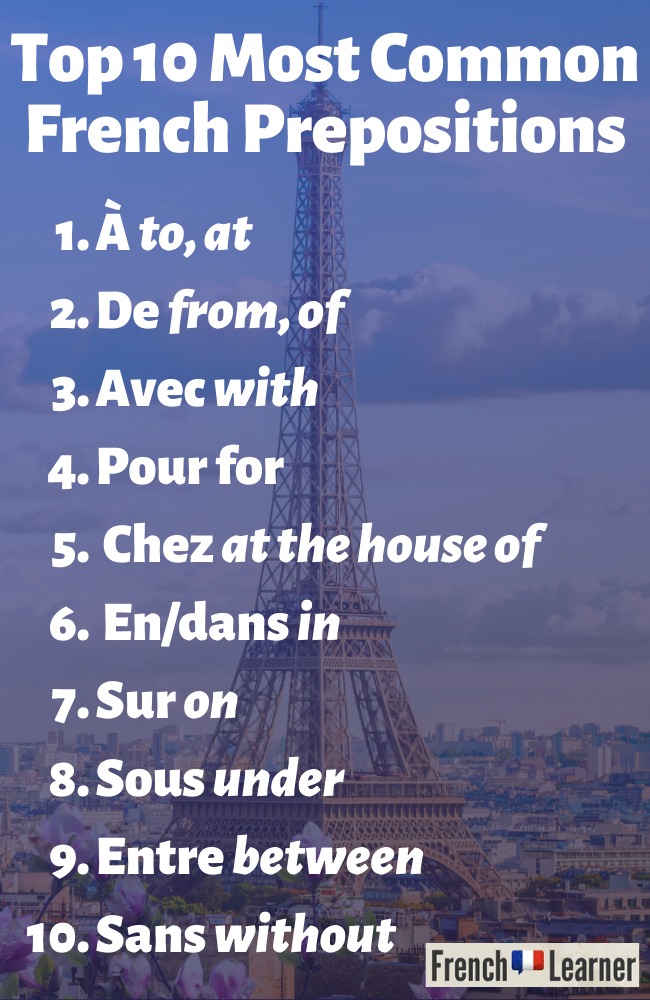What are the prepositions in French?
The four most common French prepositions are “à” (to, at), “de” (from, of), “avec” with, “chez” (at the house of) as well as “en” and “dans” (both meaning “in”). In language, a preposition is a word preceding a noun or pronoun. The page covers 30 essential French prepositions and provides practical example sentences.

French prepositions
1. À (to, at)
The preposition “à“ in French translates to both “to” and “at”. Is one of the most commonly used prepositions in the French language and can be used in a wide variety of grammatical constructions and expressions. This page on our site covers how to use the preposition “à” in detail.
- Je vais à la plage. I’m going to the beach.
- À quelle heure vous levez-vous? What time are you getting up?
- À demain! See you tomorrow!
2. Après (after)
The preposition “après“ means “after” and is used when recounting sequential events. The grammatical construction “après avoir (or être for verbs which use “être” in the passé composé) + past participle” means “after having”.
- J’arrive après vous. I’m arriving after you.
- J’ai regardé la télévision apres avoir fini mon repas. I watched TV after having finished my meal.
3. Au-dessous de (under, below)
“Au-dessous de“ translates to “under”, “underneath” and below”. This preposition can be used synonymously with “sous” (under; see below) and easily confused with “en dessus de” (on top of; see below).
- L’eau de Javel est au-dessous du lavabo. The bleach is under the sink.
4. Avant (before)
The preposition “avant“ means “before” when describing a series of events. It is easy to confuse “avant” with “devant” (see below), which means “physically in front of”. The grammatical construction “avant de + infinitive) means “before + verb”.
- J’arrive avant vous. I’m arriving before you.
- Je vous téléphonerai avant d’arriver. I’ll call you before arriving.
5. Avec (with)
In French, “avec“ means with. It one of the most commonly used prepositions in the language.
- Je mange avec une fourchette. I eat with a fork.
- Julie arrive avec Marc. Julie is arriving with Marc.
6. Contre (against)
The preposition “contre“ means against. Another translation includes “for” or “in exchange for”. The expression “contre-la-montre” (literally against the clock) refers to a time trial in cycling.
- Ils sont contre nous! They’re against us!
- Je donnerais ma fortune contre la jeunesse. I’d give away my fortune in exchange for youth.
7. Chez (at the house of)
“Chez“ mean “at the house (or home) of”. In addition to this main use, it can also be used in several other situations. This page on our site covers the preposition “chez” in detail.
- Je suis chez moi. I’m at home.
- Je vais chez le dentiste. I’m going to see the dentist.
- Faites commes chez vous. Make yourself at home.

8. Dans (in, inside of)
“Dans“ translates to “in”, and more specifically “inside of”. The preposition “en” (see below) also means “in”. This page on our site covers the differences between “en” vs. “dans”. “Dans” also precedes when a future event will occur.
- Je suis dans la voiture. I’m in the car.
- Le film commence dans une heure. The movie is staring in one hour.
9. De (from, of)
“De“ is one of the most commonly used prepositions in the French language. In addition to meaning both “from and “of”, it is used in a very wide variety of grammatical structures and expressions. This page on our site covers the preposition “de” in detail.
- Je suis de Paris. I’m from Paris.
- Je parle de vous. I’m talking about you.
10. Derrière (behind)
The preposition “derrière“ means “behind”. Specifically, it means “behind” in the context of being “physically” behind. It can also means “after”.
- Le chien est derrière la maison. The dog is behind the house.
- Jacques est arrivé derrière Marc. Jacques arrived behind (after) Marc.
11. Dès (from, starting from)
The preposition “dès“ has several translations and usages including “from” and “starting from” and is usually used in the context of time. The expression “dès que” means “once” or “as soon as”. The expressions “dès que possible” means “as soon as possible”.
- Nous commençons les leçons des aujourd’hui. We’re starting the lessons today.
- Je vous telephonerai dès que j’arriverai. I’ll call you once I arrive.
12. Devant (in front of)
The preposition “devant“ means “in front of”. More specifically, it means “physically in front of”. “Devant” is not to be confused with “avant” (see above), which means “before” (in the context of time sequence).
- La voiture est devant la masion. The car is in front of the house.
- Les enfants sont assis devant le télé. The kids are seated in front of the TV.
13. Durant (during)
“Durant“ in French means “during”. Other translation include “for” and “in the course of”. “Pendant” (see below) is another preposition meaning “during”.
- Il a plu durant quatre jours durant la semaine. It rain for four days during the week.
14. En (in)
The preposition “en” means “in” and has very wide variety of uses in the French language. Two common uses are “in”, with the context being how long it takes for an activity to occur. It it used in the context of transportation and is also the preposition preceding feminine countries. The preposition “dans” also means “in” (see above).
- Je finis le repas en dix minutes. I finish the meal in ten minutes.
- Je voyage en avion. I travel by plane.
- J’habite en France. I live in France.
15. En dessus de (on top of)
The preposition “en dessus de” means “on” or “on top of”. This preposition sounds very similar to “au-dessous de” (below, underneath; see above).
- Le livre est en dessus de l’étagère. The book is on the shelf.
16. Entre (betwee)
The preposition “entre“ means “between” in French. The expression “entre autres” means “for instance” or “for example”.
- J’habite entre Chamonix et Genève. I live between Chamonix and Geneva.
17. Envers (to, towards)
The preposition “envers“ means “to” or “towards” in the context of “towards a person”. Another similar and related preposition is “vers” also means “towards” but has different usages (see below).
- Elle est toujours sympathique envers ses enfants. She is always nice to her children.
18. Hormis (apart from)
“Hormis“ means “apart from” and is considered slightly formal language.
- J’ai tout planifié hormis la pluie. I planned for everything apart from the rain.
19. Malgré (despite, in spite of)
“Malgré“ translates to both “despite” and “in spite of”. The expressions “malgré ça” means “regardless.
- Nous partons en vacances malgré le mauvais temps. We’re going on vacation despite the bad weather.
20. Par (by, through)
The preposition “par” translates to both “by”, “by the means of”, “out of” and “through” and has a very wide range of uses in French.
- Je suis venu par train. I came by train.
- Je l’ai fait par gentillesse. I did it out of kindness.
- Le repas coute quinze euros par personne. The meal costs €15 per person.
- Il tient l’enfant par l’oreille. He’s holding the child by the ear.
21. Pendant (during, for)
“Pendant“ means both “for” and “during”. It is easy to get confused and use “pour” (see next preposition on the list) for “for” when expressing how long an event occurred.
- J’ai vécu a Montréal pendant quatre ans. I lived in Montreal for four years.
- Je regarde la télévision pendant mon déjeuner. I watch TV during my lunch.
22. Pour (for)
The preposition “pour“ means “for” and has a wide range of uses. When preceding an infinitive (“to” form of a verb), “pour” also means “for” or “in order to”.
- Il travaille pour son père. He works for his father.
- Le gâteau est pour moi. The cake is for me.
- J’apprends l’italien pour parler avec les Italiens. I’m learning Italian in order to speak with the Italians.
23. Sans (without)
“Sans“ means “without” in French. Interestingly, the expression “être sans voix” (literally “to be without a voice”) means “to be speechless” or “dumbstruck”.
- Les parents voyagent sans les enfants. The parents are traveling without the kids.
- Sans sucre, s’il vous plaît. No sugar, please.

24. Sauf (except)
The preposition “sauf“ means “except” in French. Interestingly, “sauf” as an adjective means “safe”. Hence, the expression “sain et sauf” means “safe and sound”.
- Je mange tout sauf le chou-fleur. I eat everything except cauliflower.
25. Selon (according to)
The preposition “selon” means “according to”. The expression “selon le cas” translates to “depending on the case” or “according to circumstance”.
- Selon Jacques, maintenant est un bon moment pour faire un voyage. According to Jacques, now is a good time to take a trip.
26. Sous (under)
The preposition “sous“ means “under”, “underneath” or “below”.
- Le chat se cache sous le lit. The cat is hiding under the bed.
27. Suivant (in accordance with)
The preposition “suivant” translates to “in accordance with”, “depending on”, “as per” or “according to”.
- Nous prendrons un choix suivant son opinion. We’ll make a choice in accordance with his opinion.
28. Sur (on, on top of)
The preposition “sur” means “on”, “on top of” or “over” and is the opposite of “sous” (under; see above). “Sur” is also used to express dimensions and fractions.
- Le chat est sur le lit. The cat is on the bed.
- La pièce mesure cinq mètres sur six. The room measures five by six meters.
- Il travaille cinq jours sur sept. He works five out of seven days.
29. Vers (towards, around)
“Vers“ means “towards” and “around”. In the context of “towards” it suggested “physically moving towards”. A related preposition, “envers” (see above) means “towards a person”.
- Je marche vers la plage. I’m walking towards the beach.
- J’arrive vers midi. I’m arriving around noon.
30. Vu (considering, given)
The preposition “vu” translates to “considering” and “given”.
- Vu les circumstances, nous devrions acheter la voiture. Given the circumstances, we should buy the car.



